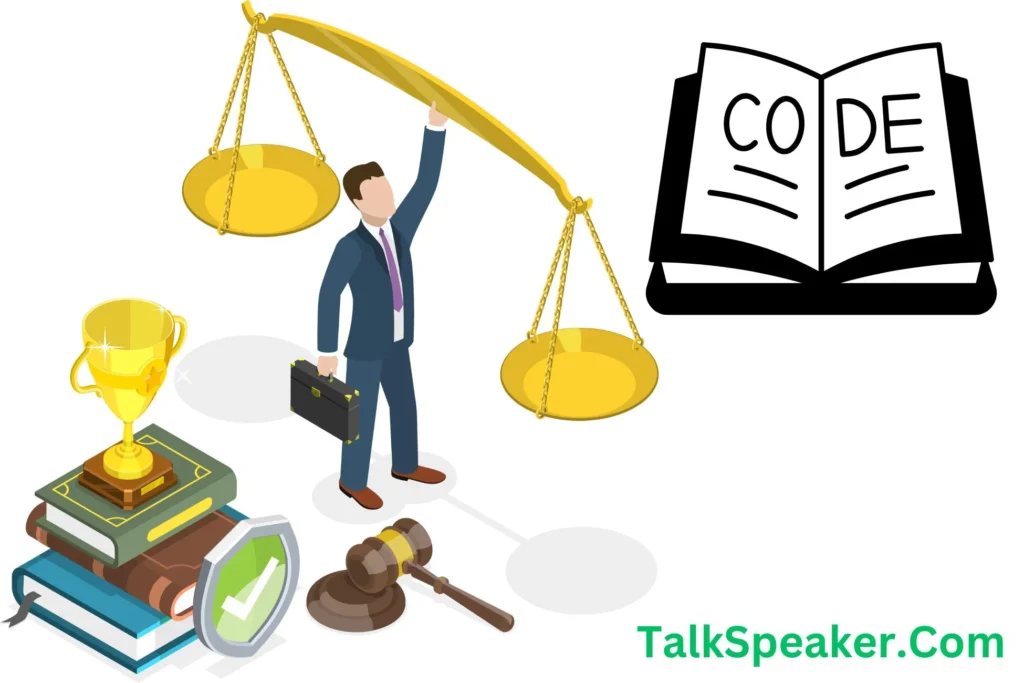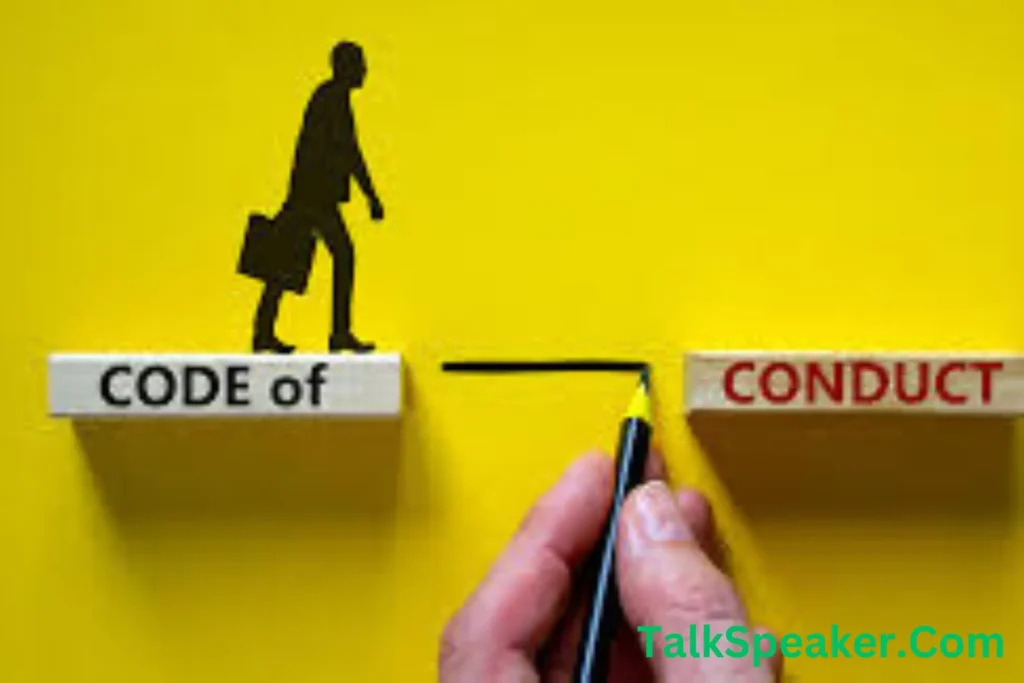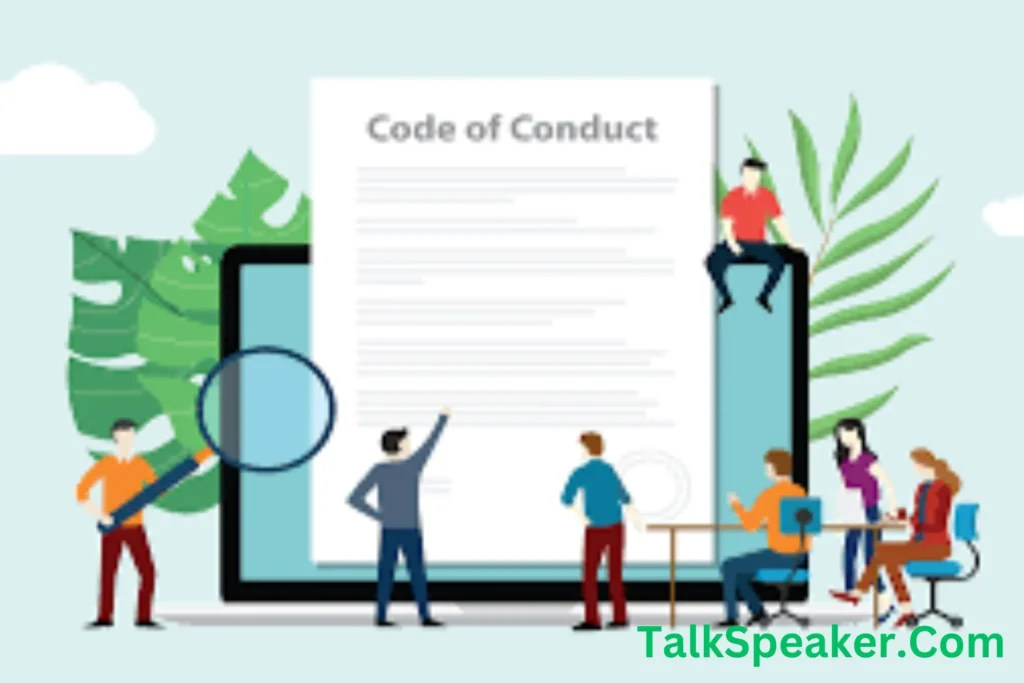Conduct is more than just how we behave—it’s a reflection of who we are and how we interact with the world around us.
Whether in personal life, the workplace, or social settings, the way we carry ourselves shapes our relationships and reputation.
Conduct reflects how we act and lead in personal, professional, and social life, shaping trust and respect.
From understanding a code of conduct to handling crisis situations.
This article will explore the different types of conduct, their significance, and practical examples to guide you in navigating various situations effectively.
What is Conduct?

At its core, conduct refers to how a person behaves, leads, or manages oneself or others.
The word originates from the Latin “conducere“, meaning “to lead together,” highlighting its connection to guidance and leadership.
Types of Conduct
Conduct manifests in diverse forms:
- Personal Conduct: Individual behavior reflecting one’s morals and values.
- Professional Conduct: Workplace behavior adhering to organizational norms and standards.
- Social Conduct: Interactions governed by societal etiquette and ethics.
Defining Conduct in Various Contexts
Code of Conduct
A code of conduct is a formal set of guidelines outlining acceptable behavior within an organization.
It serves as a framework to maintain integrity and accountability.
Key Elements in a Code of Conduct:
| Element | Description |
|---|---|
| Integrity | Acting with honesty and strong moral principles. |
| Respect | Treating others with dignity and fairness. |
| Accountability | Taking responsibility for one’s actions. |
| Compliance | Adhering to laws and regulations. |
Disorderly Conduct
Disorderly conduct is a legal term for actions that disturb public peace.
Common examples include:
- Fighting or engaging in threatening behavior.
- Public intoxication or creating loud disturbances.
- Refusing to disperse during unlawful assemblies.
Legal Consequences: Penalties vary but often include fines, community service, or even imprisonment, depending on severity and jurisdiction.
Unsportsmanlike Conduct
In sports, unsportsmanlike conduct refers to unethical or improper behavior during a game.
Examples include:
- Verbal Abuse: Insulting opponents, referees, or teammates.
- Taunting: Mocking or provoking others.
- Cheating: Violating rules to gain an unfair advantage.
This behavior often results in penalties, fines, or suspensions for athletes.
Conduct in Specific Situations

How to Conduct an Interview
Conducting an interview effectively requires preparation, skill, and follow-through.
Preparation
- Research the interviewee and their background.
- Create a list of open-ended, relevant questions.
- Choose a quiet, distraction-free setting.
Execution
- Start with an introduction to set a comfortable tone.
- Use active listening to engage the interviewee.
- Take notes for accuracy and reference.
Post-Interview
- Summarize key insights and findings.
- Send a thank-you note to the interviewee.
- Review and analyze responses.
Professional Conduct

Maintaining professional conduct ensures a harmonious and productive workplace.
Traits of Professional Conduct
| Trait | Example |
|---|---|
| Punctuality | Arriving on time for meetings. |
| Respect | Listening attentively to colleagues. |
| Confidentiality | Protecting sensitive information. |
| Adaptability | Embracing new challenges or changes. |
Poor professional conduct, such as gossiping or missing deadlines, can damage reputations and careers.
Conduct in Crisis Situations
Crisis situations demand composed and effective conduct. Key tips include:
- Stay Calm: Avoid panic to make rational decisions.
- Communicate Clearly: Provide concise, accurate information.
- Take Leadership: Assign roles and take decisive actions.
Synonyms and Alternative of Conduct Meanings
Synonyms for Conduct
Understanding synonyms helps clarify its nuances. Common alternatives include:
- Behavior: Refers to observable actions.
- Demeanor: Indicates outward mannerisms.
- Management: Relates to leading or organizing tasks.
Conduct in Music
In musical contexts, conduct refers to the role of a conductor who leads an orchestra or choir.
Role of a Conductor
- Setting the tempo.
- Ensuring cohesion among performers.
- Interpreting the composer’s vision.
The conductor’s gestures and expressions guide the performance, ensuring harmony.
Related Concepts
Ethical Conduct
Ethical conduct focuses on acting according to moral principles, such as honesty, integrity, and fairness. It is especially crucial in professions like healthcare, law, and education.
Examples of Ethical Conduct
- Reporting workplace misconduct.
- Honoring commitments and agreements.
- Treating everyone with equal respect.
Conduct vs Behavior
While often used interchangeably, these terms differ subtly:
| Aspect | Conduct | Behavior |
|---|---|---|
| Definition | Guided actions or management. | Observable actions or reactions. |
| Scope | Broader and more deliberate. | Narrower and more spontaneous. |
FAQs
What is conduct in simple terms?
Conduct is how a person acts, manages themselves, or leads others in various situations.
How does conduct affect one’s reputation?
Good conduct builds trust and respect, while poor conduct can damage relationships and credibility.
Are there universal standards for good conduct?
Although cultural norms vary, qualities like honesty, respect, and fairness are universally valued.
Conclusion
Conduct is more than just behavior—it reflects our values, ethics, and adaptability across personal, professional, and social contexts.
Whether it’s adhering to a code of conduct, managing interviews, or handling crises, understanding and improving conduct can positively impact your life and relationships.
By embodying professionalism, ethicality, and respect, we contribute to a better world.

As an experienced English teacher, I’m Jessica Thompson, here to make grammar and vocabulary simple and fun. Join me on TalkSpeaker as we explore the language together, one lesson at a time!



